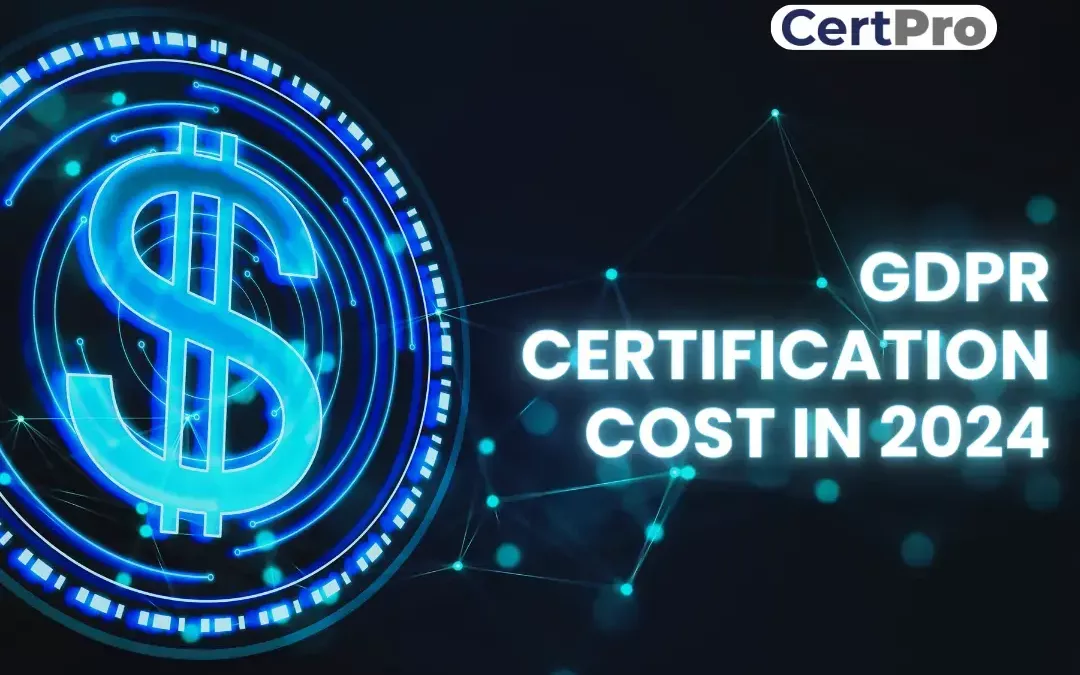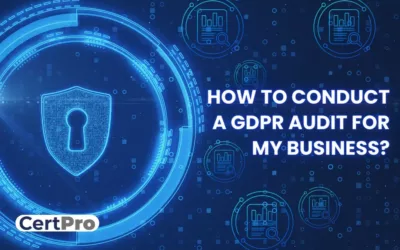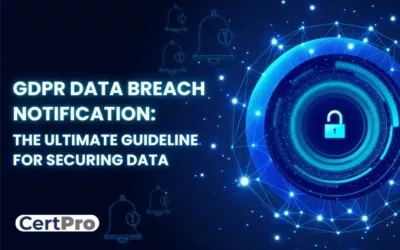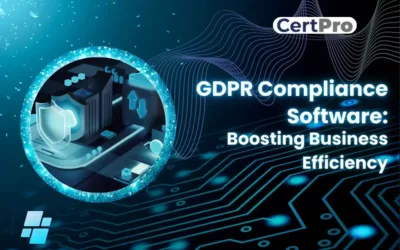The General Data Protection Regulation (GDPR) establishes stringent standards for safeguarding personal information in an era characterized by escalating concerns over data privacy and security. Since its inception in 2018, it has compelled organizations worldwide to reassess their data handling practices, putting the protection of individuals’ personal data at the forefront of their operations. GDPR certification cost can vary significantly depending on various factors, making it essential for organizations to understand the intricacies involved.
One way organizations are demonstrating their unwavering commitment to GDPR compliance certification cost is through the pursuit of the certification. While not a mandatory requirement under this program, this certification serves as a potent tool for earning trust, both from customers and regulatory bodies.
As we step into 2024, this article aims to shed light on the intricacies of GDPR certification cost. While the pursuit of certification can indeed be a strategic decision, understanding the factors influencing these costs and the broader implications of certification is crucial. In this article, we will explore what drives certification expenses, considerations for organizations looking to embark on this journey, and the lasting benefits that certification can bestow upon those who embark on this path of data protection excellence.
OVERVIEW OF GDPR CERTIFICATION
The General Data Protection Regulation , enacted in 2018, has transformed the landscape of data protection and privacy. It not only imposes stringent requirements on how organizations handle personal data but also offers a mechanism for them to showcase their commitment to data privacy through this certification.
The certification, also known as conformity assessment, is a voluntary process that enables organizations to obtain third-party validation of their GDPR compliance efforts. This certification serves as tangible evidence that an organization is dedicated to adhering to the rigorous data protection standards outlined in the regulation. Certification also provides a competitive advantage in a business environment where data privacy concerns are paramount. It sets certified organizations apart from their competitors, making them more attractive to customers who value data protection.
Furthermore, the certification can serve as a form of legal protection. While it does not grant immunity from legal action, it can be a mitigating factor in the event of data breaches or regulatory investigations. Regulators often view certified organizations more favorably, which may lead to more lenient enforcement actions. Global recognition is another key benefit of certification. It is not restricted to European Union (EU) organizations; organizations worldwide can obtain the certification.
However, it’s essential to note that certification GDPR cost can vary widely depending on factors such as the organization’s size and complexity, the choice of certification body, the scope of the assessment, the current state of compliance, and the nature of data processing activities.
FACTORS AFFECTING THE COST OF GDPR CERTIFICATION
Several factors influence the cost of obtaining General Data Protection Regulation certification in 2024. Understanding these factors is crucial for organizations planning to embark on the certification journey and budgeting effectively.
1. Type of Certification: Depending on the type of Certification, GDPR certification costs can change. Some Certifications could cost extra to achieve since they require more effort and money. The cost of a GDPR Practitioner Certification may be higher than that of a GDPR Foundation Certification, for instance.
2. Organizational size: The cost of certification may vary depending on the size of the organization. The data processing processes of larger organizations could be more complicated, requiring more time and resources to monitor and evaluate. This can make Certification more expensive.
3. The Complexity of Data Processing Activities: The complexity of an organization’s data processing activities can also affect the cost of certification. Organizations that process large amounts of personal data or use more complex processing methods may require more extensive reviews and assessments, which can increase the GDPR cost of Certification.
4. Level of Organizational Preparedness for Certification: The price may vary depending on the organization’s level of preparedness for certification. Companies that have already put GDPR compliance cost procedures in place may need fewer time and resources to get certified, which can lower the cost. On the other side, organizations that haven’t yet put any GDPR Compliance measures in place might need to put in more effort to get certified, which would raise the cost.
In conclusion, a multifaceted interplay of factors influences the cost of obtaining the certification in 2024. Organizations must carefully assess their specific circumstances, consider these factors, and conduct thorough planning and budgeting to navigate the certification process effectively and efficiently while reaping the benefits of compliance.
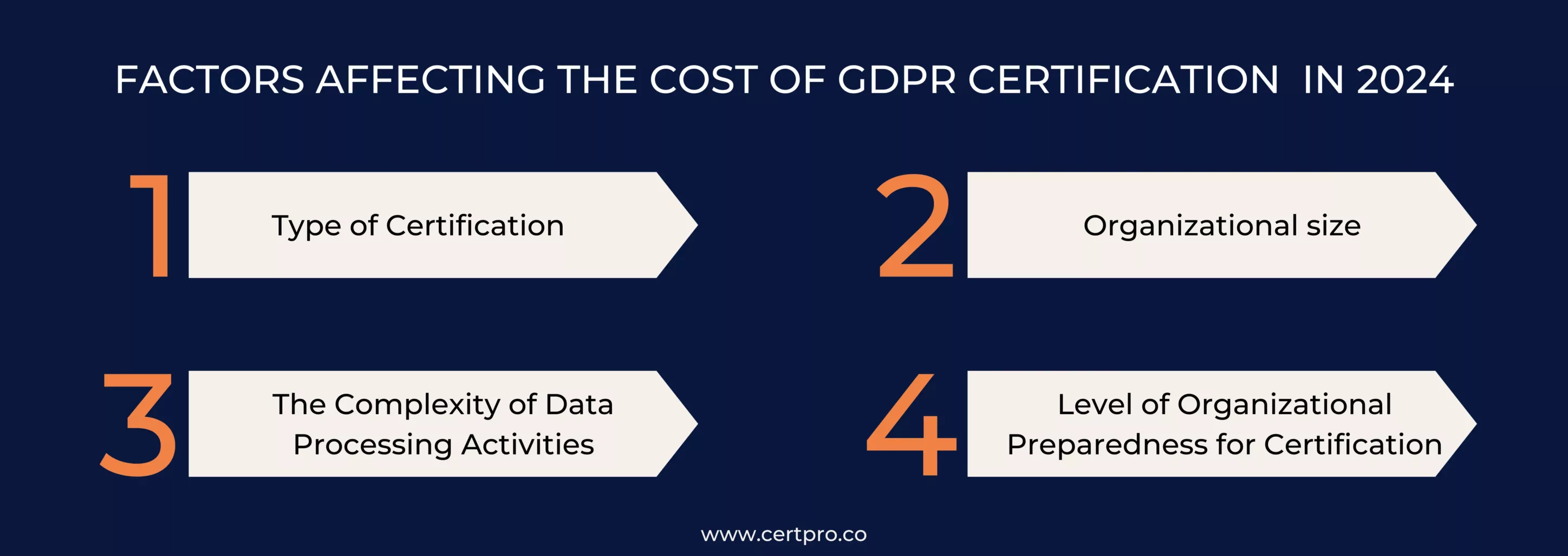
ESTIMATING GDPR CERTIFICATION COST
While it’s challenging to provide precise figures for GDPR certification costs in 2024 due to the aforementioned variability, organizations can take specific steps to estimate their potential expenses accurately.
1. Determine Scope: Begin by defining the scope of the certification assessment. Decide which aspects of your organization’s data processing activities you want to include in the certification process. A broader scope will generally result in higher costs.
2. Research Certification Bodies: Conduct thorough research and contact various certification bodies or auditors to obtain quotes and fee structures. Compare costs and consider the reputation and expertise of each body.
3. Assess Current Compliance: Conduct an internal assessment of your organization’s current GDPR compliance cost. Identify any gaps or deficiencies that may require remediation before pursuing certification.
4. Budget for Remediation: Allocate a budget for addressing compliance gaps and deficiencies that may be identified during the certification assessment. This budget should cover the necessary resources and measures to achieve compliance.
5. Consider Recertification: Remember that certification is an ongoing process. Budget for recertification costs, which typically occur every one to three years, depending on the chosen certification body’s requirements.
6. Leverage Internal Resources: Determine whether you have internal resources available for the compliance tasks. Utilizing internal expertise can reduce reliance on external consultants, potentially lowering costs.
7. Factors in Geographic Considerations: Consider the geographic location of your organization and the certification body. Costs may vary based on location, so factor this into your budget calculations.
By systematically considering these factors and conducting thorough research, organizations can develop a comprehensive estimation of the costs involved in obtaining this certification in 2024. This approach not only helps in budgeting accurately but also ensures that the certification process is well-planned and aligned with the organization’s specific needs and compliance goals.
GDPR CERTIFICATION COST BREAKDOWN
Estimating and understanding the breakdown of General Data Protection Regulation certification costs in 2024 is crucial for organizations striving to enhance data protection and privacy practices. While exact costs can vary widely depending on factors like organization size, scope, and location, we can outline a general cost breakdown to provide insights into the key components to consider.
1. Certification Body Fees (30–40%): The largest portion typically goes to the certification body or auditor.
2. Consulting and Training (15–25%): Many organizations require consulting services to prepare for the certification. This includes hiring external the experts or consultants to assist in compliance assessments and remediation efforts.
3. Internal Resources (10–15%): Allocating internal resources to compliance efforts is a significant factor. This includes the time and effort of employees dedicated to data protection activities and internal audits.
4. Remediation Costs (10–15%): If compliance gaps or deficiencies are identified during the certification assessment, organizations must budget for remediation efforts.
5. Technology Investments (5–10%): Some organizations may need to invest in new technologies or upgrade existing systems to meet the requirements.
6. Data Protection Impact Assessments (DPIAs) (5–10%): DPIAs assess the impact of data processing activities on individuals’ privacy. The complexity and number of required DPIAs can impact costs in this category.
7. Documentation and Compliance Tools (5–10%): This certification often requires thorough documentation of data protection practices. Expenses related to creating, updating, and maintaining compliance documentation, as well as the use of compliance tools, contribute to this cost category.
8. Recertification and Ongoing Compliance (5–10%): Organizations should budget for periodic recertification costs, which typically occur every one to three years.
It’s important to note that these percentages are general estimates, and the actual breakdown can vary widely based on an organization’s unique circumstances and choices.
HOW MUCH DOES GDPR COMPLIANCE COST?
The cost of complying with GDPR varies depending on the size and complexity of the company and might range from $20,500 to $102,500. But the cost analysis ought to go beyond financial factors. The implementation process’s efforts, which include modifying policies and procedures, must be taken into account. The distribution of resources’ time is equally important, since their participation in compliance measures requires both a lot of resources and time. As a result, the overall cost of GDPR compliance takes into account both the overt financial outlays and the covert expenses related to organizational work and time commitment. For enterprises trying to manage the challenges of GDPR compliance, a comprehensive grasp of these complicated expenses is essential.
WHAT ARE THE CONSEQUENCES OF FAILING TO COMPLY WITH GDPR?
When organizations fail to comply with GDPR requirements, they may face both internal and external consequences. Noncompliance has consequences that go beyond financial penalties, including a loss of customer trust, disruptions in corporate operations, and other negative outcomes. The commitment to protect data subjects’ rights becomes increasingly important as the value of personal data rises, perhaps leading to increased fines. GDPR noncompliance has substantial consequences, including:
1. Financial fines: A fine of 20 million euros or 4 percent of the company’s yearly worldwide turnover, whichever is bigger, may be imposed for non-compliance with the GDPR. One prominent example is the Cambridge Analytica case against Facebook, in which the company was fined £500,000 ($700,000) for mining EU users’ data without authorization; however, this was done before the implementation of GDPR. Should this violation have been covered under GDPR, Facebook might have been subject to fines of up to $1.5 billion. This emphasizes the much higher financial penalties that organizations may have to pay under GDPR laws if they violate the restrictions regarding improper handling of customer data.
2. Reputational damage: Although most businesses are primarily concerned about the financial ramifications of GDPR non-compliance, there are also serious threats to the reputation and trust of their customers. Customers and clients lose faith in businesses as a result of breaches involving personal data, which has a severe negative influence on earnings and future business opportunities. In the past, a lot of companies were reluctant to report data breaches; however, GDPR now requires users to be notified of breaches automatically. This move highlights the crucial connection between trust, reputation, and an organization’s overall capacity to carry out business successfully in the wake of data security breaches. It also indicates a greater emphasis on transparency.
3. High expenses associated with compliance for small firms: Due to their limited resources, small businesses find it difficult to comply with all GDPR rules. This is because they cannot afford the necessary security and legal advice. As a result, these businesses must modify their business plans and may have to stop some aspects of their operations. Small firms are actively participating in data minimization measures to eliminate unneeded data in an attempt to avoid the need to develop new infrastructure. The realistic steps small firms have taken to negotiate the complex world of GDPR compliance within the limitations of their financial resources are reflected in this strategic change.
INTERPRETATING 2024 GDPR CERTIFICATION COST WITH CERTPRO
The certification, although not a mandatory requirement, stands as a potent tool for organizations looking to navigate the complex landscape of data privacy and security. CertPro emerges as a valuable partner in the certification journey. As a leading certification body, CertPro brings expertise, credibility, and a commitment to upholding the highest standards of data protection. Organizations can rely on CertPro to provide robust certification services, assisting them in achieving GDPR compliance certification cost and reaping the benefits of enhanced data protection and privacy practices.
As we move further into the digital age, where data privacy and security concerns continue to escalate, certification remains a powerful tool for organizations to build trust, gain competitive advantage, and ensure that personal data is handled with the utmost care and integrity. In 2024 and beyond, embracing this certification is not just a strategic choice; it’s a testament to an organization’s dedication to protecting the privacy and rights of individuals in an increasingly data-driven world.
FAQ
WHAT IS GENERAL DATA PROTECTION REGULATION CERTIFICATION, AND WHY IS IT RELEVANT IN 2024?
The certification confirms an organization’s compliance with the European Union’s General Data Protection Regulation. In 2024, it will remain relevant as data privacy concerns persist and compliance helps avoid hefty fines, build trust, and navigate the evolving landscape of data protection regulations.
HOW ARE THE COSTS OF GENERAL DATA PROTECTION REGULATION CERTIFICATION DETERMINED?
Various factors, including the organization’s size, complexity, location, scope of certification, existing compliance level, and the GDPR fees charged by the chosen certification body, collectively influence the overall cost of the certification process.
IS THIS CERTIFICATION MANDATORY AND HOW MUCH DOES GDPR COMPLIANCE COST?
The certification is not mandatory; it is a voluntary process. GDPR compliance costs vary based on organization size and complexity, ranging from $20,500 to $102,500. Additionally, consideration should be given to implementation efforts and resource time.
WHAT FACTORS INFLUENCE THE COST OF OBTAINING THE CERTIFICATION IN 2024?
Factors such as the organization’s size, complexity, geographic location, scope of certification, current compliance status, and the fees charged by the chosen certification body influence the cost of obtaining the certification in 2024.
WHAT ARE THE POTENTIAL BENEFITS OF GENERAL DATA PROTECTION REGULATION CERTIFICATION FOR ORGANIZATIONS?
The certification can offer several benefits to organizations, including enhanced data protection compliance, improved customer trust, competitive advantage, and reduced legal risks.

About the Author
BHOOMIKA JOIS
Bhoomika Jois is a creative content writer specializing in compliance, ISO 27001, GDPR, and SOC 2. As a Social Media Marketing Specialist, she amplifies her engaging content. Bhoomika’s knack for simplifying complex topics makes compliance and cybersecurity accessible to all.
HOW TO CONDUCT A GDPR AUDIT FOR MY BUSINESS?
The General Data Protection Regulation (GDPR) is vital for today's digital landscape. It is a cornerstone for safeguarding people's privacy rights in the European Union (EU). Therefore, organizations dealing with EU residents' data must follow these GDPR rules....
GDPR DATA BREACH NOTIFICATION: THE ULTIMATE GUIDELINE FOR SECURING DATA
Modern businesses require incorporating personal data protection strategies to ensure customer satisfaction and business growth. In this respect, the European Union's General Data Protection Regulation (GDPR) sets strict standards for maintaining data security....
GDPR Compliance Software: Boosting Business Efficiency
Handling large amounts of personal data has become a significant concern in today's digital landscape, necessitating a thorough understanding of the intricate legal framework, particularly within the European Union. An essential piece of legislation in this regard is...

